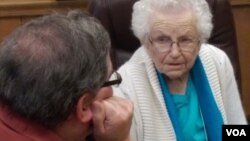At a senior center in Nashville, Tennessee, Doug Oliver and his friend, Geneva McElroy, talk about old times.
But it is more than a simple stroll down memory lane. Through guided conversation, Oliver helps seniors remember their own self-worth by drawing on the memories of experiences long past.
“They can see what they have done that has or will impact the future and it lifts their mood," he said. "Many times they will realize that they are and were important; that they have something to offer.”
In a society that celebrates eternal youth, a renewed appreciation of wisdom and experience can help older people cope with loss and depression. Oliver says the technique, sometimes called “reminiscence therapy” is especially effective with seniors.
“One of the hidden benefits that many elders have is that, even when they are having trouble with short-term memory, their long-term memories are usually intact for a much longer time,” he said.
Short term and long term memories are stored in different areas of the brain. Diseases that impair one may not affect the other. Alzheimer’s Disease, for example, begins in the areas of the brain where short-term memories are created and held.
Oliver used that quirk of the human brain to help his geriatric patients during the more than two decades he worked as a clinical therapist. Retired now, he no longer has patients, but each week he visits the daycare facility for seniors. He tries to lift the spirits of the people he’s come to care about, because depression for seniors can be deadly.
“Without trying to lift the depression a little bit, people can languish quickly and deteriorate," he said, "and so part of the purpose is to take that healthy part of their thinking and get that firing as passionately as you can.”
Oliver says the key is to connect the past to the present and the future; both good experiences and bad, victories and regrets.
“Help them to determine what they learned from those incidents, those memories," he said. "How did that apply to them and their families in the present, and what impact do they think they have had on the future.”
Catholic Charities, which runs the facility, couldn't be happier with Oliver's work. Senior daycare coordinator Linda Edwards says he has a gift for helping the elderly feel valued.
“They respond readily to his interest in them and his ability to get them to talk about what they remember, what they enjoyed," Edwards said. "And they come away from those interactions feeling good about themselves.”
Every once in a while Oliver thinks about quitting because he is legally blind, a result of macular degeneration, so getting to the daycare center and home again can be a chore. But Oliver says he has always been drawn to seniors and the stories they tell.
“Each time I consider that, I actually step back and say, ‘No. I am where I need to be right now, and I am doing what I should be doing.’”
Oliver says an added benefit to listening to the stories seniors tell is that it brings history alive in a way nothing else can.









